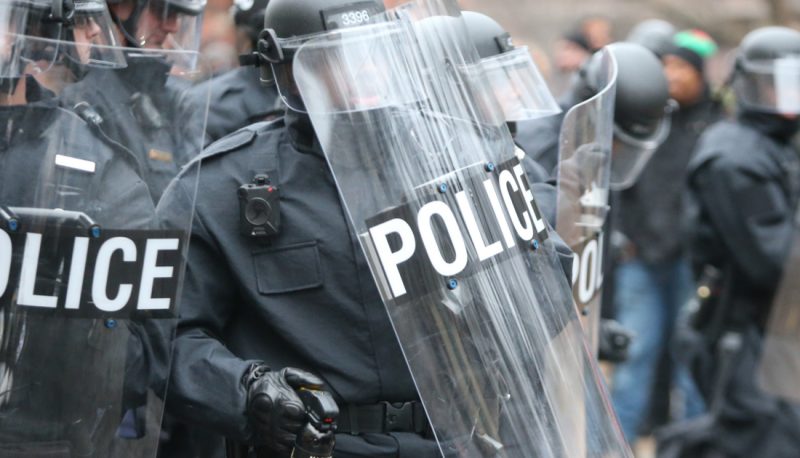If you’ve followed any of the recent cases of police brutality and misconduct, or any of the thousands of cases over the last five decades, you’ve probably heard the term “qualified immunity.” And you might have wondered what it means. It’s a good question to explore because the legal concept of qualified immunity has created a police force which feels invincible – and acts like it.
Police abusing their authority is nothing new, but the legal loophole they use wasn’t always so expansive. Let’s look at where qualified immunity came from, how it’s being applied today, and why we need to abandon it completely.
What is Qualified Immunity?
Qualified immunity is a legal doctrine that makes it nearly impossible for people to sue police officers (and other government officials) for violating their constitutional rights. Often, it is invoked to protect police officers who have hurt or killed people in their custody. It is very difficult for a person to sue because they have to prove that the officer violated “clearly established law.”
Especially under far-right judges, this has come to mean in practice that there has to be another identical case in which an officer was found liable. And it has to be identical in virtually every way, in every detail and every circumstance, which is practically impossible. This means that police officers tend to assume – rightly – that there is almost no chance they will be personally sued for any harm they inflict on a person in the course of their job.
Where Did Qualified Immunity Come From?
It all goes back to the Civil Rights Movement of the 1960s. In a 1967 Supreme Court case called Pierson v. Ray, the Court was considering the unlawful arrest of a group called the Freedom Riders who were protesting segregation. In that case, they argued that their arrest in 1961 was an attempt to enforce segregation in public transit, which the Supreme Court had already ruled was unconstitutional.
The police claimed they arrested the Freedom Riders not to enforce segregation, but to prevent violence by an allegedly unruly crowd (which the ministers said the police were lying about). The state law giving police the power to arrest the Freedom Riders under this pretext was not struck down until 1965. So it was in effect at the time, and the police said they were acting in good faith that it was legal. Chief Justice Earl Warren, however, said that “if [the officers] acted in good faith and with probable cause in making an arrest under a statute that they believed to be valid” they shouldn’t be held liable.
Essentially, Warren was saying that if the police reasonably believe the law they are enforcing is constitutional, they cannot be sued for infringing on citizens’ constitutional rights. Over the decades, that idea has turned into a permission slip for brutality. As Justice Sotomayor has written, the current Supreme Court’s “one-sided approach to qualified immunity transforms the doctrine into an absolute shield for law enforcement officers, gutting the deterrent effect of the Fourth Amendment.”
What Will It Take To Hold Police Accountable?
At the federal level, there’s a clear path to ending qualified immunity. Under federal law, 42 U.S.C. § 1983 (Section 1983), those acting on behalf of the state, like police, are liable for violating citizens’ constitutional rights. This is the law that the Supreme Court has narrowly held in cases of qualified immunity only applies when an officer violates a “clearly established law.” Congress could amend Section 1983 to specifically exclude qualified immunity, and they’ve tried before. The George Floyd Justice in Policing Act is one attempt. However, it currently seems stalled.
States can also create laws which exclude the defense of qualified immunity when state civil rights are violated. To be effective, these laws must explicitly state that lawsuits can be brought against law enforcement officers and that qualified immunity is not a defense to civil liability. One state already taking action is Colorado, which allows citizens to sue law enforcement officers for violation of civil rights and doesn’t allow qualified immunity as a defense. This can be a model for other states going forward.
Unfortunately, passing bills at all levels means repeatedly wading through a sea of special interests and contending with a culture that too often acts like cops can do no wrong. Police unions are extremely powerful and have stood in the way of accountability for officers. And the Far Right has notoriously sided with law enforcement on many occasions. Despite the obstacles, progress is possible, and we can all play a part.
How Can You Take Action To Help End Qualified Immunity?
First, stay educated. Local, state, and federal bills are being introduced to address qualified immunity. Contact your representatives at all levels of government and tell them that you support ending qualified immunity. Our report, All Safe: Transforming Public Safety also includes important information about qualified immunity and other issues surrounding public safety and police accountability.
Second, get involved, to whatever degree you’re able. When cases of police brutality or overreach occur, step up, whether that’s joining a march or a phone bank or just sharing information. It’s hard. It takes time. It takes physical, mental, and emotional energy, but it can make a difference.
Ending qualified immunity is a long road, but it’s one worth taking. Police must be held accountable for their actions, and having a legal loophole to avoid responsibility makes us all less safe. Let’s work together to eliminate qualified immunity and improve public safety nationwide.
